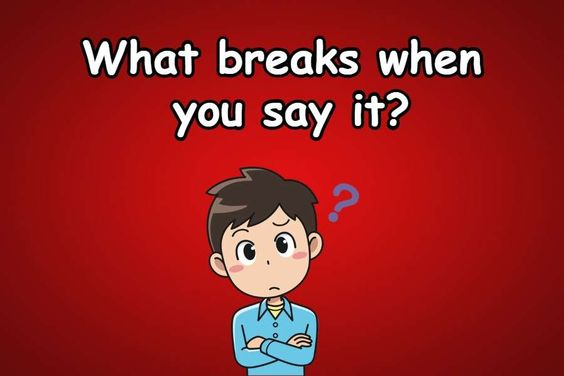Are you a parent trying to grab and maintain your kids’ attention on a particular topic? Are you confused and trying too many different teaching methods to stimulate your little one’s mind? If yes, riddles for kids will help you do all of that! And we just happen to have the right curation of riddles too!
Math & ELA | PreK To Grade 5
Kids see fun.
You see real learning outcomes.
Watch your kids fall in love with math & reading through our scientifically designed curriculum.
Parents, try for free Teachers, use for free
Young minds need to be challenged. And riddles for kids will help you do exactly that!
Typically, a riddle is a statement, question, or phrase that has a hidden meaning in it. Answering them correctly will require kids to think creatively and apply a different set of solutions to each problem statement. Kids’ riddles and jokes, like the ones listed below, encourage kids to have fun and introduce them to some clever humor.
Related Reading: Brain Games for Kids to Nurture Holistic Development
Top 117 Kid-friendly Riddles With Answers
This list of good riddles for kids with answers will not only get their analytical juices flowing but will also get them entertained! Let’s look at some good riddles along with their answers!
27 Easy And Funny Riddles With Answers for Kids
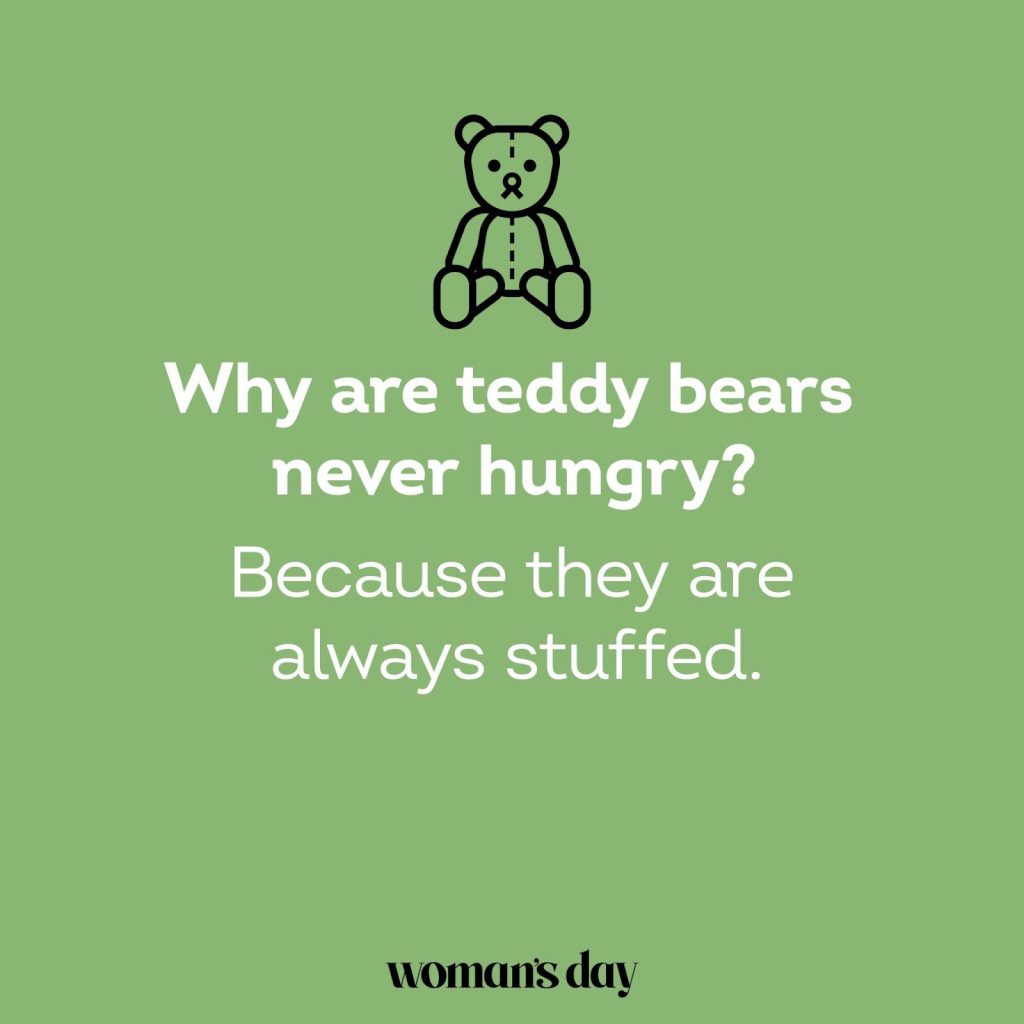
Here is the collection of funny and easy riddles with answers, perfect for keeping your kids entertained and flexing their brainpower.
- Riddle: You measure my life in hours and I serve you by expiring. I’m quick when I’m thin and slow when I’m fat. What am I?
Answer: A candle. - Riddle: I am so simple that I can only point, yet I guide people all over the world.
Answer: Compass - Riddle: I am not alive, but I grow; I don’t have lungs, but I need air. What am I?
Answer: A balloon. - Riddle: What begins with T ends with T and has T in it?
Answer: A teapot - Riddle: What has thirteen hearts, but no other organs?
Answer: A deck of cards - Riddle: What is easier to get into than out of?
Answer: Trouble - Riddle: Remove my skin and I won’t cry, but you might!
Answer: An onion - Riddle: What can fill a room but doesn’t take up space?
Answer: Light - Riddle: Where are the lakes always empty, the mountains always flat and the rivers always still?
Answer: A map - Riddle: A man looks at a painting and says, “Brothers and sisters I have none, but that man’s father is my father’s son.” Who is in the painting?
Answer: His son - Riddle: I am taken from a mine, and shut up in a wooden case, from which I am never released, and yet I am used by almost every person. What am I?
Answer: Pencil lead. - Riddle: What is always in front of you but can’t be seen?
Answer: The future - Riddle: What has many teeth but can’t bite?
Answer: A zipper. - Riddle: What has legs but cannot walk?
Answer: A chair - Riddle: What can kids make but never see?
Answer: Noise. - Riddle: What can you catch but not throw?
Answer: A cold. - Riddle: What goes up but never comes down?
Answer: Your age. - Riddle: What comes out at night without being called, and is lost in the day without being stolen?
Answer: The stars. - Riddle: I shave 25 times a day and still have a beard? What am I?
Answer: A barber - Riddle: What kind of band never plays music?
Answer: A rubber band - Riddle: Bob’s mother has three children. Their names are Huey, Dewey, and … ?Answer: Bob
- Riddle: What two things can you never eat for breakfast?
Answer: Lunch and dinner. - Riddle: What is powerful still so delicate that it breaks when you say its name
Answer: Silence - Riddle: I can be cracked. And I can be made. I can be told. And I can be played. What am I?
Answer: A joke - Riddle: What is made of water, but if you put it into water it vanishes?
Answer: An ice cube. - Riddle: What has to be broken before you can use it?
Answer: An egg! - Riddle: What has a face and two hands but no arms or legs?
Answer: A clock!
18 Math Riddles With Answers for kids
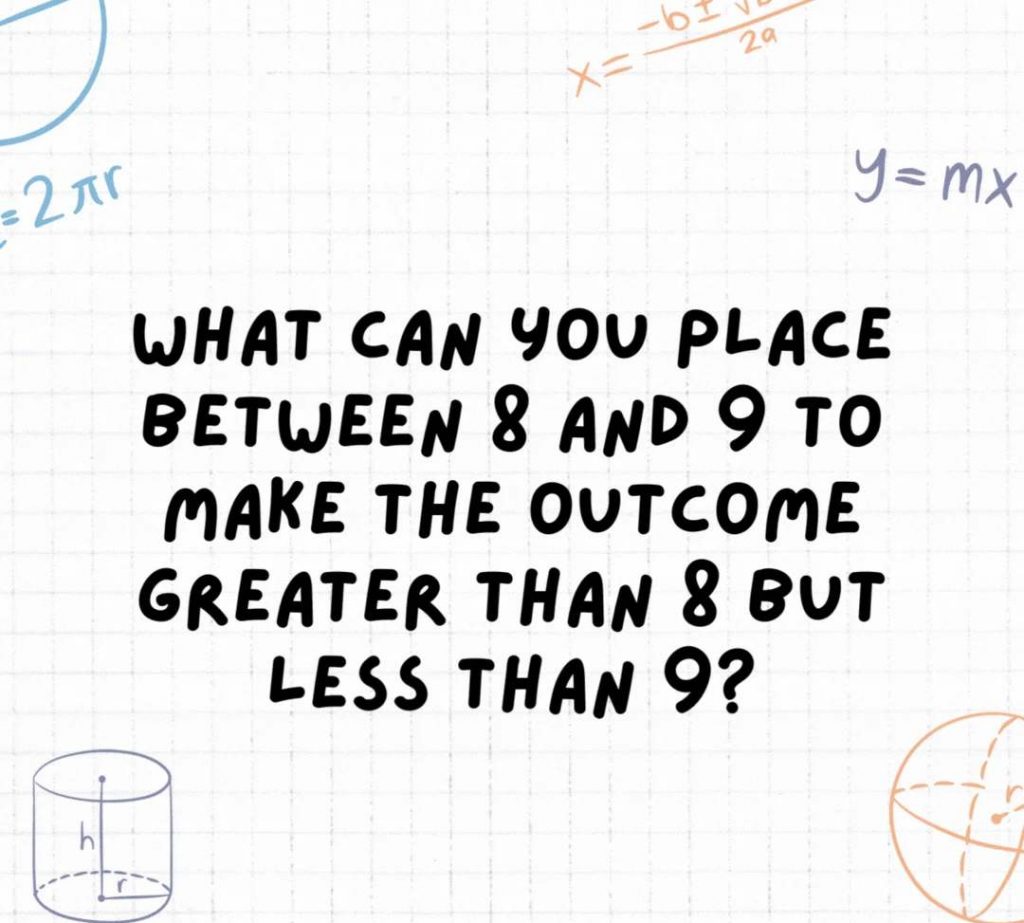
- Riddle: There are 3 apples in a basket and you take away 2. How many apples do you have now?
Answer: 1 Apple. (If we subtract 2 apples from the initial 3 apples, we are left with 1 apple.) - Riddle: 81 x 9 = 801. What do you need to do to make this equation true?
Answer: Turn it upside down: 108 = 6 x 18 - Riddle: What 3 numbers give the same result when multiplied and added together?
Answer: 1, 2, and 3 (1 + 2 + 3 = 6 and 1 x 2 x 3 = 6). - Riddle: What number is twice the sum of its digits?
Answer: 18 (1 + 8 = 9, and 9 * 2 = 18). - Riddle: I am an odd number. Take away a letter and I become even. What number am I?
Answer: Seven - Riddle: I am a three-digit number. My tens digit is five more than my ones digit. My hundreds digit is eight less than my tens digit. What number am I?
Answer: 194. - Riddle: What did the triangle say to the circle?
Answer: You are pointless. - Riddle: How many seconds are in a year?
Answer: Twelve — January 2nd, February 2nd, March 2nd… - Riddle: A word I know, six letters it contains, remove one letter and 12 remains, what is it?
Answer: Dozens. - Riddle: What can you always count on when you need to add things up during tough times?
Answer: Your fingers. - Riddle: Outside of A to Z, how many letters are in “the English alphabet”?
Answer: 18 letters: 3 in “the,” 7 in “English,” and 8 in “alphabet.” - Riddle: What three positive numbers give the same result when multiplied and added together?
Answer: 1, 2, and 3 (1 + 2 + 3 = 6 and 1 * 2 * 3 = 6). - Riddle: You have a basket that’s one foot in diameter and one foot deep. How many apples can you fit in the empty basket?
Answer: Only one, because then it’s not empty anymore. - Riddle: Ms. Smith has four daughters. Each daughter has a brother. How many kids are there in total?
Answer: Five, there are four daughters and one son. Each daughter has the same brother. - Riddle: What month of the year has 28 days?
Answer: All of them! - Riddle: Four legs up, four legs down, soft in the middle, hard all around. What am I?
Answer: A bed. - Riddle: Why was 6 afraid of 7?
Answer: Because 7, 8 (ate), 9! - Riddle: Using only addition, how do you add eight 8’s and get the number 1,000
Answer: 888 + 88 + 8 + 8 + 8 = 1,000.
Related Reading: Best Math Riddles for Kids with Answers
26 Animal Riddles With Answers for Kids
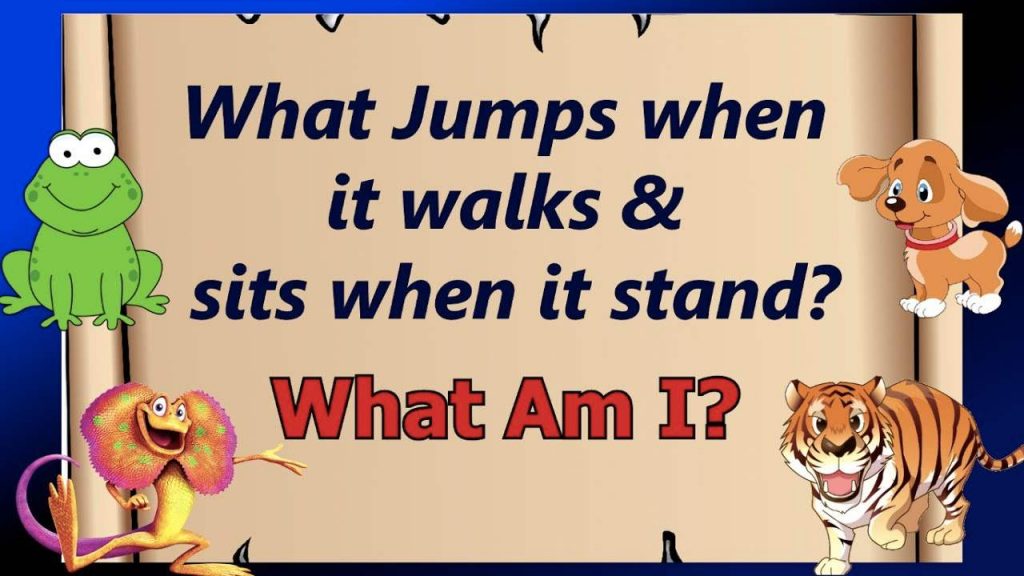
- Riddle: What kind of lion never roars?
Answer: A dandelion. - Riddle: What goes z to a?
Answer: Zebra. - Riddle: I grow down as I grow up. What am I?
Answer: A goose. Goose feathers are called down. - Riddle: A rooster is sitting on the roof of a barn facing west. If it laid an egg, would the egg roll to the north or to the south?
Answer: It’s impossible — roosters don’t lay eggs. - Riddle: Why do bees have sticky hair?
Answer: Because they use their honeycombs. - Riddle: What do you call a bear with no teeth?
Answer: A gummy bear. - Riddle: What’s black, white and blue?
Answer: A sad zebra. - Riddle: What has a thousand needles but cannot sew?
Answer: A porcupine. - Riddle: I’m known as man’s best friend. Who am I?
Answer: Dog. - Riddle: Without me Thanksgiving and Christmas are incomplete, when I’m on the table everyone tends to overeat. What am I?
Answer: Turkey. - Riddle: I jump when I walk and sit when I stand. What am I?
Answer: Kangaroo. - Riddle: A cowgirl road into town on Friday. Three days later, she left on Friday. How is that possible?
Answer: Friday is the name of her horse. - Riddle: I am a sea animal with eight arms and a soft body. I squirt ink to protect myself. Who am I?
Answer: Octopus - Riddle: I am a big cat with black stripes and sharp claws. I love to hunt in the jungle. Who am I?
Answer: Tiger. - Riddle: I am a slow-moving animal with a hard shell on my back. I love to munch on leafy greens. Who am I?
Answer: Turtle. - Riddle: I have black and white stripes and live in Africa. I am the tallest land animal in the world. Who am I?
Answer: Zebra. - Riddle: I am a colorful bird with a curved beak. I love to imitate human speech. Who am I?
Answer: Parrot. - Riddle: What do you call a pig that does karate?
Answer: A pork chop! - Riddle: Why did the chicken cross the playground?
Answer: To get to the other slide! - Riddle: What do you call a camel that can play music?
Answer: A dromedary DJ! - Riddle: What do you get when you cross a zebra with a donkey?
Answer: A zonkey! - Riddle: Why did the frog call his insurance company?
Answer: He had a jump in his car! - Riddle: What do you call a dog magician?
Answer: A labracadabrador! - Riddle: What kind of dog never bites?
Answer: A hot dog. - Riddle: Why do gorillas have big nostrils?
Answer: Because they have big fingers! - Riddle: What has wings but can’t fly?
Answer: An Ostrich.
Related Reading: Best Animal Trivia Questions for Kids With Answers
27 Hard Riddles With Answers for Kids
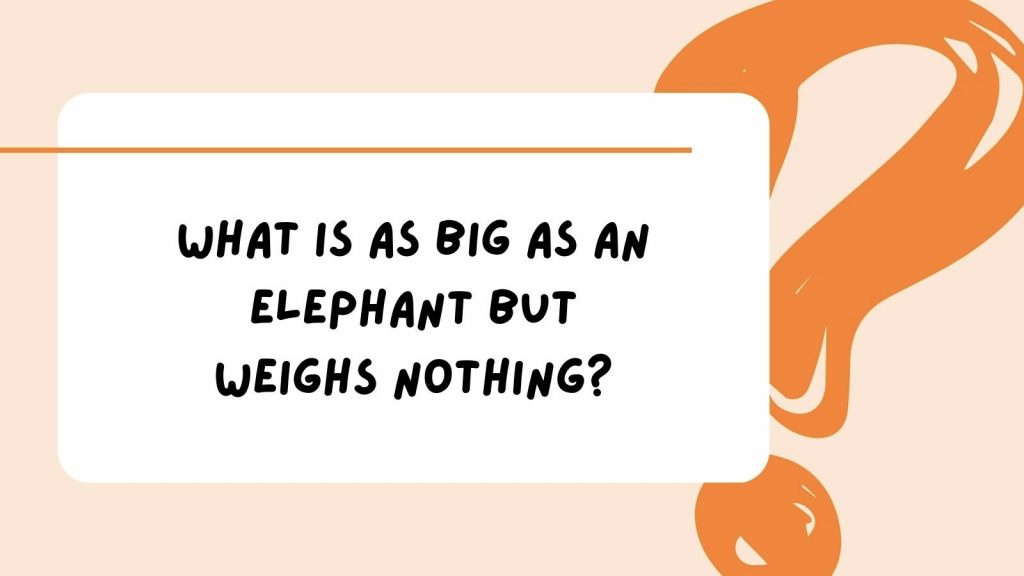
- Riddle: What starts with a P, ends with an E and has thousands of letters?
Answer: The post office - Riddle: What kind of tree can you carry in your hand?
Answer: A palm - Riddle: What building has the most stories in the world?
Answer: The library - Riddle: I make a loud sound when I’m changing. When I do change, I get bigger but weigh less. What am I?
Answer: Popcorn - Riddle: What runs but cannot walk, has a mouth but no teeth and has a bed but cannot sleep?
Answer: A river - Riddle: I’m taller when I’m young, shorter when I’m old. What am I?
Answer: A candle - Riddle: The more you take, the more you leave behind. What am I?
Answer: Footsteps. - Riddle: What’s full of holes but still holds water?
Answer: A sponge - Riddle: What appears once in a minute, twice in a moment, but not once in a thousand years?
Answer: The letter “M” - Riddle: If you drop me, I’m sure to crack, but smile at me and I’ll smile back. What am I?
Answer: Mirror - Riddle: What has a head and a tail but no body?
Answer: Coin - Riddle: What is yours but mostly used by others?
Answer: Your name - Riddle: You can drop me from the highest building and I’ll be fine, but if you drop me in water I die. What am I?
Answer: Paper. - Riddle: You’ll find me in Mercury, Earth, Mars and Jupiter, but not in Venus or Neptune. What am I
Answer: The letter R - Riddle: I’m light as a feather, yet the strongest person can’t hold me for five minutes. What am I?
Answer: Your breath - Riddle: What goes in a birdbath but never gets wet?
Answer: The bird’s shadow - Riddle: I shrink smaller every time I take a bath. What am I?
Answer: A bar of soap. - Riddle: What has many rings but no fingers?
Answer: A telephone - Riddle: What has hands and a face, but can’t hold anything or smile?
Answer: A clock - Riddle: What can you break, even if you never pick it up or touch it?
Answer: A promise - Riddle: I go all around the world, but never leave the corner. What am I?
Answer: A stamp - Riddle: Give me a drink, and I will die. Feed me, and I’ll get bigger. What am I?
Answer: A fire - Riddle: If you drop a yellow hat in the Red Sea, what does it become?
Answer: Wet - Riddle: What word begins with E and ends with E, but only has one letter
Answer: Envelope - Riddle: I’m always on the dinner table, but you don’t get to eat me. What am I
Answer: Plates and silverware - Riddle: Which question can you never answer “yes” to?
Answer: “Are you asleep?” - Riddle: What has 88 keys?
Answer: The Piano.
10 English Riddles with Answers for Kids
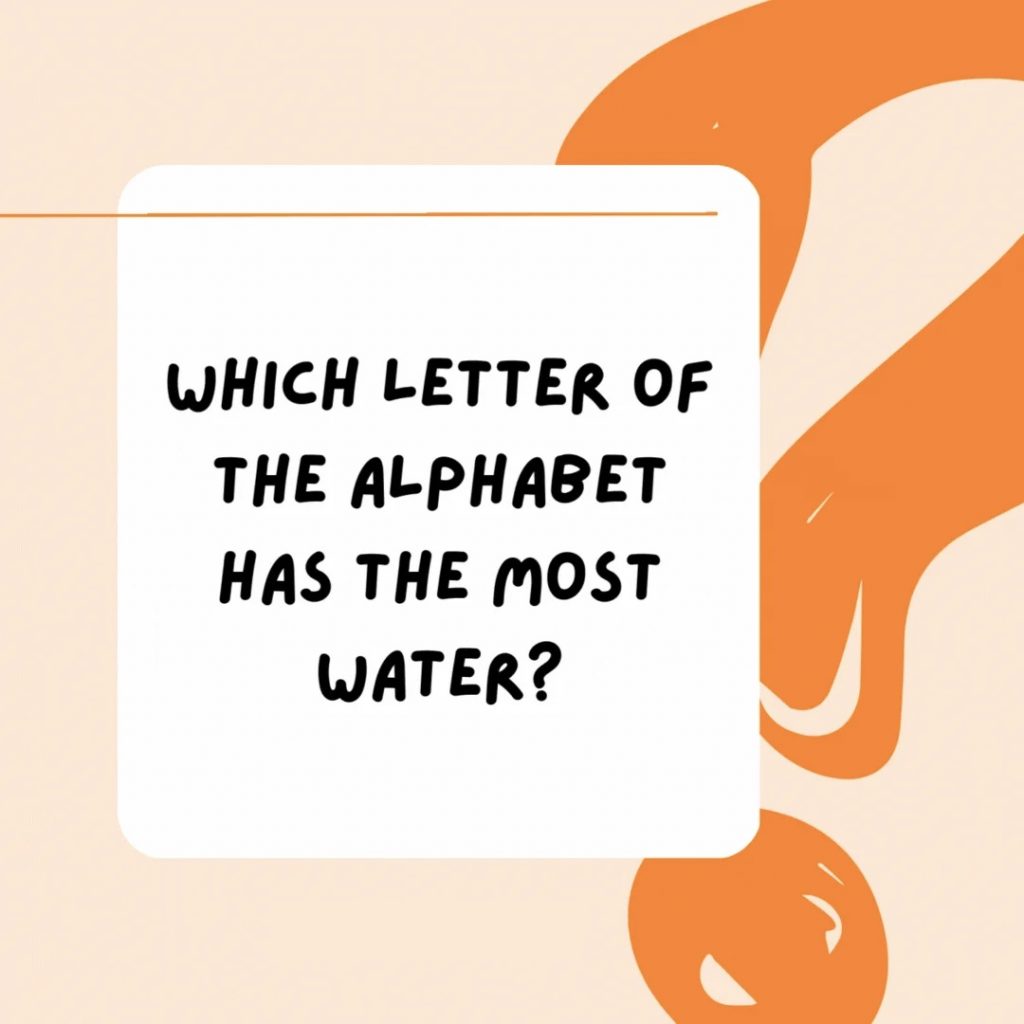
- Riddle: There is one word spelled wrong in every English dictionary. What is it?
Answer: Wrong - Riddle: I have branches, but no fruit, trunk or leaves. What am I?
Answer: A bank. - Riddle: How do you make the number one disappear?
Answer: Add the letter G and it’s “gone” - Riddle: Where does Thursday come after Friday?
Answer: The dictionary - Riddle: What is in seasons, seconds, centuries, and minutes but not in decades, years, or days?
Answer: The letter N - Riddle: Which letter of the alphabet has most water
Answer: The letter C - Riddle: I have keys but open no locks. I have space but no room. You can enter, but you can’t go inside. What am I?
Answer: A keyboard - Riddle: I have a spine but no bones. I have pages but no face. What am I?
Answer: A book - Riddle: I’m a word of letters three, add two and fewer there will be. What am I?
Answer: Few - Riddle: I fly without wings. I cry without eyes. Wherever I go, darkness follows me. What am I?
Answer: A cloud
9 Tricky Riddles With Answers for Kids
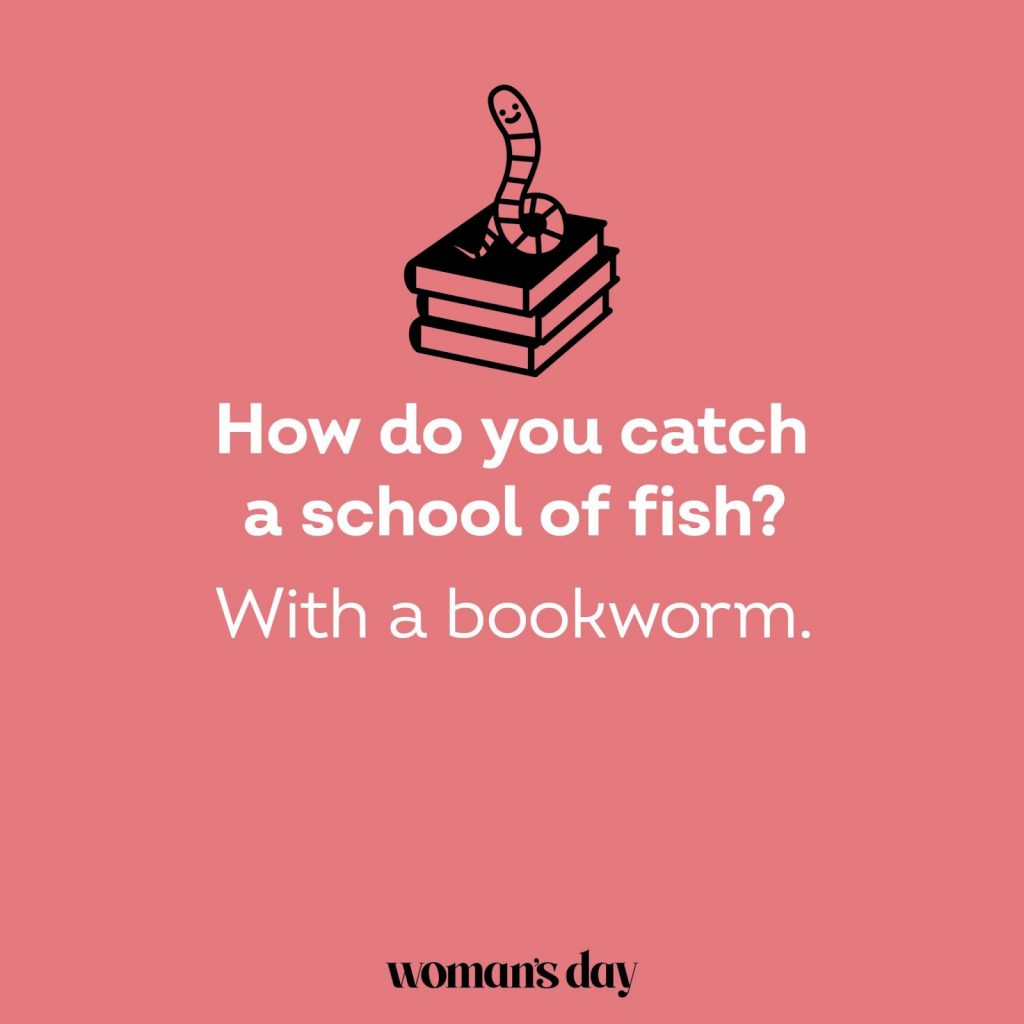
- Riddle: I speak without a mouth and hear without ears. I have no body, but I come alive with the wind. What am I?
Answer: An Echo. - Riddle: The person who makes it, sells it. The person who buys it never uses it. What is it?
Answer: A coffin. - Riddle: What has a neck but no head?
Answer: A bottle. - Riddle: When you need me, you throw me away and when you are done with me, you bring me back. Who am I?
Answer: An Anchor - Riddle: I speak without a voice and am heard, though silently. What am I?
Answer: A thought - Riddle: If you have me, you want to share me. If you share me, you haven’t got me. What am I?
Answer: A secret. - Riddle: What has a thumb and four fingers, but is not a hand?
Answer: A glove. - Riddle: What has a heart that doesn’t beat?
Answer: An artichoke. - Riddle: What is always coming but never arrives?
Answer: Tomorrow.
These kid-friendly riddles with answers are perfect for kids as they are playful and will surely challenge young minds in the best way possible!
Related Reading: Fun What Am I Riddles for Kids [With Answers]
Conclusion
This list of riddles for kids can really help you stimulate their minds and help them learn and develop skills like logical thinking. Riddles can also help kids develop critical thinking skills and practice vocabulary. Use these fun riddles for kids or let them make their own- either way they’re sure to have a lot of fun!
Related Reading: Best Tricky Questions for Kids [With Answers]
Frequently Asked Questions (FAQs)
Do riddles play a part in boosting child development?
Riddles play a crucial role in enhancing the mental capacity of children by promoting critical thinking and problem-solving skills. They serve as an excellent tool for nurturing creativity and comprehension in children. Moreover, riddles offer a contextual platform that enables children to grasp the meaning of complex vocabulary effortlessly.
How do riddles enhance speech development?
Riddles offer an exceptional opportunity for children to develop their listening skills, comprehend the multiple meanings of words, and learn how to manipulate language. Notably, riddles present an enjoyable activity that motivates children to engage with words and promote their interest in reading.
How to make use of riddles as a classroom activity for kids?
When presenting a riddle to your class, allocate some time for group discussions among the students to deliberate on possible answers. Encourage your students to consider both the humorous and serious responses. Subsequently, encourage groups of students to share their thoughts and ideas with one another.
What are the benefits of riddles for kids?
Riddles for kids enhance critical thinking and problem-solving skills while also boosting their creativity and understanding of language nuances.

















